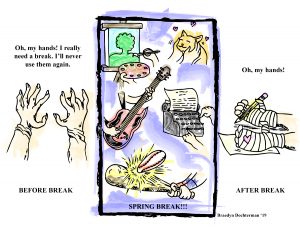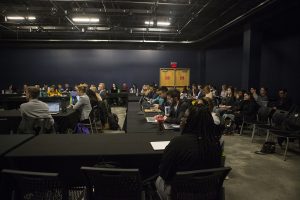Guest Opinion: What the Odyssey teaches us about good undergraduate research mentoring
UI Ph.D. student Lance Bennett writes on the importance of mentoring undergraduate student researchers.
The Old Capitol is seen on Nov. 25, 2018.
April 7, 2019
Well, it’s that time of year — job- and internship-hunting season. Students seek out letters of recommendation from current and past professors and research mentors. Some students participate in summer-research programs while others serve in a faculty mentor’s or department’s lab. The skills learned through research mentorship are invaluable and translate to the workforce; however, these experiences become good when students have good mentors.
So, what makes a good mentor? To answer this question, we must take a trip to antiquity by examining Homer’s story of the Odyssey. The epic opens with the goddess Athena disguised as Mentor, the old friend of Odysseus. While searching for his father, Telemachus receives guidance and support from Mentor. Throughout time, society has continued to use the word “mentor,” which means “a wise and trusted counselor or teacher.” Thinking back to my undergraduate journey, my mentors were exemplary professors who helped me make sense of research ideas for my honors thesis, research trajectory for graduate school, and preparation for conference submission.
It is, therefore, important for faculty to care enough about the development of undergraduate students outside the classroom. Some may argue that students receive their research knowledge through methods courses, which culminates in a final exam, and perhaps a pilot study or group paper. However, research mentoring is an experiential component wherein students can enhance and develop skills needed for next career step, whether it be joining the workforce or starting graduate education. The University of Iowa is a doctoral-granting institution wherein graduate mentoring is central, and undergraduate students deserve the same quality of guidance.
Being a good research mentor to undergraduates requires additional time and effort, but it helps students to think critically, clarify career paths, and provide more understanding into how scholars make claims about the world. Below are few specific things mentors can do to provide students with a good experience:
1. Communicate effectively with your mentees. This involves articulating clear expectations for the mentees while helping them develop their academic and professional goals. Mentor always communicated with Telemachus, serving as a guide for the journey.
2. Don’t assume undergraduates know nothing. In my experience, students know more about research than they let on. Conceivably, they feel that they know nothing working with an experienced researcher. So, inquire about what research knowledge they have toward the beginning of the relationship. Similarly, Mentor consistently questioned Telemachus to grasp his understanding of the journey ahead.
3. Be understanding when challenges arise. Students are going to make mistakes. Use this as a growth opportunity by assisting them in working through the problem. Telemachus experienced challenges, mainly because of his youth, but Mentor stood by his side throughout the epic.
— Lance K. Bennett
Ph.D. student
UI communications studies






